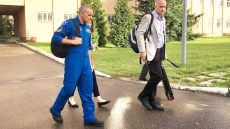OTTAWA — A health care group that represents the majority of university hospitals says losing Saudi Arabian medical residents is likely to result in delays, but ultimately won't impact the quality of care.
Paul-Emile Cloutier, the president and CEO of HealthCareCan, says the primary concern among some hospitals is that there will be a delay in care in certain medical fields.
About 1,000 Saudi residents and fellows were called back to the kingdom when it suspended diplomatic relations with Canada, a dramatic and angry response to a government tweet that criticized the Saudis for the arrest of female social activists.
The medical residents have been told to return to the country by Aug. 31, forcing hospitals to come up with contingency plans in order to fill the gaps.
Cloutier says contingency planning includes working out call schedules, weekend coverage and determining who will train students, which was the responsibility of the residents.
Cloutier says delivery of health care is not exclusive to office hours, and many Saudi residents cover weekends and overnight call shifts.
While he stopped short of naming specific programs likely to experience delays, Cloutier says he knows of a neurosurgery department that will lose a significant number of Saudi residents.
"That means the person who would be getting the care might have to wait a little longer than usual because there's 13 people absent," he said.




